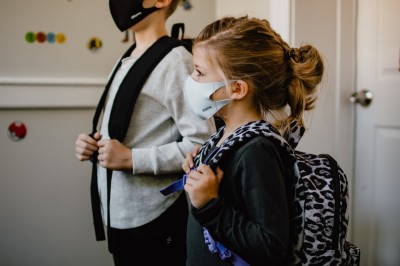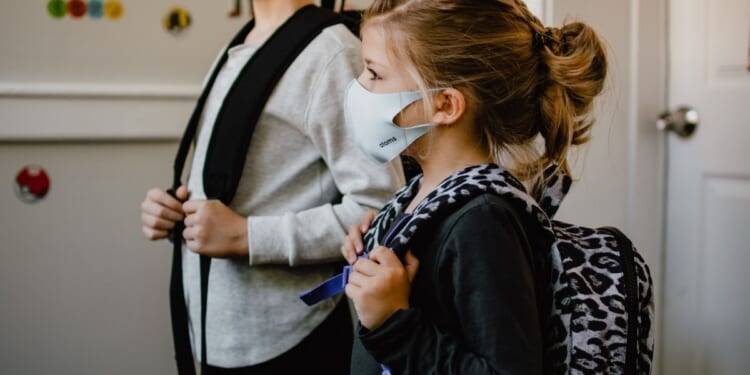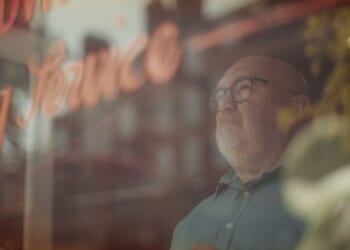
While cleaning out some old email a few weeks ago, I stumbled upon some messages I’d sent to a confidant in 2020 and was taken aback by the depth of despair in my troubled musings.
It was one of those seasons where I’m glad it’s in the rearview mirror as it was a dark time for many. The COVID-19 pandemic was unnerving enough, but when you add in the summer riots, the contested presidential election that Fall, and all the ways social upheaval ensued around all of that, the nation and the world were convulsing. It struck me how quickly so many of us seem to have decided to move on from that time, preferring instead to forget the turmoil and purge the trauma from our collective memory to the extent it’s possible.
Adults may be able to compartmentalize that to some degree, but it will indelibly mark the children who were forced to endure it, and a new film called “15 Days: The Real Story of America’s Pandemic School Closures,” skillfully documents the catastrophe that it was for them. Released on X in late September and already viewed over 1 million times, the documentary reveals the profoundly disruptive lurch it was for those who were coming of age during that terrible season.
Filmmaker Natalya Marakhver narrates the story, which flows seamlessly, explaining the deterioration of youth mental health, learning loss, the desecration of parental rights, and other vital freedoms that were jeopardized through COVID-19 policies, particularly pertaining to school shutdowns and the shoddy, politicized science that underpinned them.
Featuring a broad range of voices of many races, socio-economic classes, and professions, “15 Days” reveals both the uniqueness and universality of the suffering of that period with hopeful glimpses of cross-partisan community solidarity when children are being harmed. That our leaders expected youngsters to learn virtually for months on end, eyes burning in front of screens all day and disconnected from their peers outside of a traditional classroom setting, was nothing short of a disaster. It was monstrously abusive, and we have not remotely begun to grapple with its long-term effects. Hearing anecdotes from the youngsters who experienced it in their own words is jarring.
Marakhver marshals the evidence in compelling fashion that these irrationally long school closures, over 500 days in some parts of America, were carried out in service to leftist political goals and “equity,” much to the chagrin of many, including some irked left-wingers.
The film takes particular aim at several left-wing political figures, notably American Federation of Teachers president Randi Weingarten, as one of the main orchestrators of advocating that schools remain closed well past what was necessary. Though much of the general public now believes that nefarious motives were operating during the pandemic, in light of everything Weingarten and others said, it’s hard not to believe that school closures were cynically and disgracefully used in pursuit of transparently political goals at the expense of the health and well-being of children.
For many, myself included, it was bewildering to watch nations like Sweden recognize the plain truth that children were at very low risk of contracting the disease and thus, their schools could and did open back up relatively soon after the pandemic besieged the world. “15 Days” documents this disparity in policy very effectively.
But what induced vertigo — indeed, what mentally broke many people across the political spectrum — was the public health messaging that was sent through various media that, somehow, protesting in large groups was fine in the aftermath of George Floyd, but other social gatherings, including kids going to school, were still deemed unsafe or as “superspreaders.”
Indeed, why was gathering in the streets with hundreds or thousands of Black Lives Matter marchers acceptable, but going to church or school with much smaller groups unacceptable? And when the data showed that there was no substantial spread of the disease two weeks after those large group protests occurred in those cities? That’s when the deep suspicion that something was deeply amiss sank in for many people.
As Maud Maron, a former Democrat turned Republican, who ran for District Attorney in New York City, observes in the film, regardless of what people thought of the social justice cause, whether they were for it or against, “it had been drilled into our heads for months and months and months that groups of people close together was a life or death health risk.”
But the opposite was true, and few were willing to say so.
One of the figures who did say so and whom the film honors as a hero of this troubled time is Dr. Jay Bhattacharya, who is now the director of the National Institutes of Health.
At great professional risk and personal cost, the Stanford epidemiologist was among the few dissenting doctors who courageously stuck their necks out and criticized the pandemic policies in a document called the Great Barrington Declaration. This declaration disputed the vaunted “science” espoused by revered public health commissioners and others like Dr. Anthony Fauci and Dr. Francis Collins. Collins, Bhattacharya’s predecessor at the NIH, called the declaration “dangerous” and Fauci called it “nonsense.” Despite impeccable credentials and academic accomplishments, Bhattacharya was smeared as a “fringe” epidemiologist who wanted to kill people. Yes, really.
Bhattacharya believes the American and British press attacked him and his colleagues in part at the instigation of the government.
“We know this because there are FOIA’d documents that have emerged,” he explains in the film.
Those documents show, among other things, email correspondence from Collins calling for a “quick and devastating takedown” of Bhattacharya’s work.
It’s safe to say now that the NIH director has been vindicated.
Marakhver feels personally vindicated, too. The daughter of Soviet immigrants, the documentary concludes with the filmmaker poignantly recalling how school was her shot at the American dream. Education gave her a healthy structure and had she been forced to endure the 2020 pandemic policies, while her parents tried to scrape together a life, it would have devastated her. An uneasiness beset her when the “two weeks to slow the spread” message was sent, knowing in her gut that it was unwise and that reopening schools would prove onerous.
All in all, though this recent history is no doubt unpleasant to revisit, major props to Marakhver for painstakingly telling the story. God forbid another pandemic occurs anytime soon, but if it does, “15 Days” should serve as a reminder of what not to do policy-wise while admirably showcasing the enduring strength of family and community, and what connects us across ideological lines, when faced with institutional deception and injustice.
I give it five stars.
Send news tips to: brandon.showalter@christianpost.com Listen to Brandon Showalter’s Life in the Kingdom podcast at The Christian Post and edifi app Follow Brandon Showalter on Facebook: BrandonMarkShowalter Follow on Twitter: @BrandonMShow
















